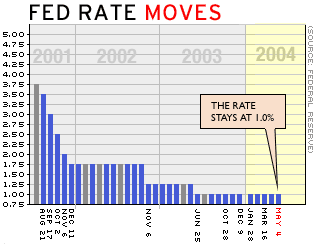NEW YORK (CNN/Money) -
For months, Wall Street has been nervous about the prospect of higher interest rates, and a new survey shows that anxiety has only gotten worse lately.
But recently there have been signs such jitters could be overblown. If so, then stocks could be in for a relief rally.
The June survey of 225 global fund managers by Merrill Lynch, released on Wednesday, highlighted the worry investors feel about monetary policy. Sixty-five percent of those surveyed said global monetary policy is "too stimulative," compared with just 35 percent in May.
Ninety percent of those surveyed said inflation would be higher in the next 12 months, and 10 percent said it would be "a lot higher," compared with just 4 percent in May.
Most fund managers said they believed Fed policy wouldn't be considered neutral until the U.S. central bank's target for the fed funds rate, the key overnight lending rate it manipulates to run the economy, is at 3 percent. The rate now stands at 1 percent, the lowest level in more than 40 years, and fed funds futures contracts are only pricing in a rise this year to 2.25 percent.
In other words, most fund managers believe the Fed, which says it wants to raise rates at a "measured" pace, is dangerously behind the curve, keeping the accelerator too close to the floor and risking runaway inflation.
"This view of U.S. monetary policy is more aggressive than many might have imagined," David Bowers, Merrill's chief investment strategist, said in the survey report. "It means that, even if the Fed raises rates in line with the futures market, Fed policy will still be stimulative at the end of this year."
Words of wisdom
In response to the inflation hawks, Fed policy makers took turns last week making aggressive noises, saying they'd jack rates up fast at the first sign of runaway inflation.
But there have been signs lately that the hawks' view could be too aggressive. For example, of the 90 percent of fund managers who believe inflation will be higher this year, 32 percent blame higher commodity prices.
If the price of oil, a vital commodity, stays as high as it's been lately, then their view could be justified. But oil has cooled off in recent weeks, and other commodity prices, including copper, cotton and soybeans, have fallen significantly since peaking earlier this year.
What's more, commodity prices are only a small part of corporate costs and inflation. Wage and salary growth is the biggest component, and that has been slow to recover from a prolonged labor market slump following the 2001 recession.
Tuesday's news from the Labor Department that its core consumer price index, stripping out the recent -- hopefully temporary -- explosion in food and energy costs, grew at an anemic pace in the 12 months ending in May was another hint that maybe Wall Street's overdone it a bit. Stocks rose in response.

"The numbers today will confirm what the Fed's been saying -- they're concerned about inflation, but they don't think it's an imminent concern," said John Hughes, market analyst with Epiphany Equity Research.
Still, Hughes said he would prefer that the Fed raise rates aggressively at its next policy meeting, scheduled for June 29-30, by a half-percentage point. Otherwise, if the Fed just raises a quarter point, as the market expects, traders will do nothing but sit around and wait anxiously for another quarter-point hike at the following meeting, scheduled for Aug. 10.
"That would be my preference as a trader, because then we won't have this overhang," Hughes said. "What would be the catalyst that offsets that overhang and causes stocks to rally?"
One potential catalyst, obviously, would be if economic reports keep landing in the sweet spot they've been in lately, with production and job growth strong and inflation relatively tame -- the fabled "Goldilocks" economy.
Though some analysts believe an expected deceleration in corporate earnings growth and economic activity could keep stocks sailing in choppy waters this year, the relief of steady economic growth and tame inflation could fuel a bounce.
"There's a lot of bad news priced into the market," said Alfred Kugel, senior investment strategist at Stein Roe & Farnham in Chicago. "If things turn out not to be as bad as discounted, we will have a rally this summer, and we will end the year 10 percent higher than we are now."
But the jury's still out on that; there are signs that inflation still has plenty of life.
For example, somewhat lost in the rush of economic data on Wednesday was evidence in the University of Michigan's consumer sentiment survey for June that consumers are suddenly ratcheting up their short- and long-term inflation expectations.
Inflation expectations can be a self-fulfilling prophecy -- if you believe everybody else is going to raise prices, you'll want to raise the prices you charge for your labor, goods or services to keep up, and other workers and companies will do the same.
"To the extent that the Fed has emphasized how important benign inflation expectations are in maintaining price stability," said Steve Stanley, economist with RBS Greenwich Capital Markets, "the June results are disturbing."

|